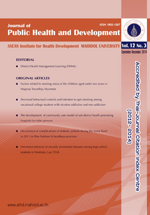District Health System Management Learning: A big leap forward to people-centred District Health System in Thailand
Main Article Content
Abstract
Reinforcement of District Health System workforce capabilities has been boosted from 2007 onwards through a “Context Based Learning” approach and evolved through actions and reflections of three main sets of experiences: i) Primary Care Practice Learning started in 2007; ii) Family Practice Learning started in 2012; and iii) District Health Management Learning (DHML) started in 2014.
DHML aims to facilitate effective networking for people-centred District Health System through the process of Participatory Interactive Learning through Actions (PILA). A Learning Team (LT) is set up in each participating district to learn from one local health driven project expected to improve on DHS development and quality of life of the people. The LT is usually made of 2-3 members from the hospital, 2-3 from the district health office and health centres, 2-3 from non-health, especially, people sector. For project implementation, the learning team interacts with several actors within the DHS and also beyond its limits: the “operational network”. Systematic links are established between LTs and supportive actors building in this way a large “learning network”: a local Preceptor (P) who directly supports the LT in the field; a Learning and Coordination Centre (LCC) in charge of facilitating regular exchange among 4-5 LTs within the same learning network; Academic Institutions (AI), some agents of which participate systematically in all learning process (assigned AI), others participating only when specific expertise is needed in relation to academic menus (AI on demand); and Sources of Learning (SL) for learning from site visits and relevant experts. Core competencies (self-control, vision and goals, planning, leading for change, working in team, and using management tools) and shadow competencies (values, relationships, communication, and power management) are expected to increase and to be accepted as necessary competencies for management of DHS.
Developmental evaluation, focusing on theory-driven, and realist evaluation, had been carried out systematically by the promoters since the beginning of the implementation (from June 2014 to August 2016), with the periodic and systematic participation of an international guest expert, and supported by data collection of a Thai academic team. The methods for collecting data were participatory observation of the DHML processes and reflections (at district, provincial, regional, and national levels), visits of several DHML local projects and interviews of key persons related to DHML and a questionnaire survey. From 2014 to 2015, 227 LTs, 216 Ps, 44 LCCs, 52 AIs, and several SLs in different regions of the country have participated in the process as DHML pioneers (from 2015 to 2016, had gradually been increasing). The definition of core and shadow competencies of management of DHS was well accepted by all participants; significant improvement of self-control (for better listening) and working in team among the core competencies, and of all four competencies among the shadow competencies was qualitatively expressed through stories telling, narratives writing, and systematic interviews. Learning networks (AIs-LCCs-Ps-SLs) to support the current and subsequent batches of LTs were successfully established. Matrix teams/links/networks in the districts were significantly facilitated and supported through the implementation of the DHML projects with a clear direction toward person- and people-centred care.
DHML fits into a sustainable comprehensive and continuous grounded capacity building which is now functioning in most districts in Thailand and still evolving. Several teams and facilitating conditions are being set up in order to work better together: functional relationship, continuously learn together: learning relationship, strengthen the organization together: managerial relationship, for sustainable development of people-centred district health systems.


